Sarah and I awoke with the rising of the sun, stirring out from underneath the blankets we had laid over the blue foam mattresses strapped to the deck of the yacht. We were anchored near St. Nicholas Island, once home to a Byzantine trading town, now home to sprawling ruins, the peeking sun painting yellow and orange the white stone shapes poking through brush and marching up the spine of the island to its rounded top.
There was no boat to the island, but no matter. Without saying anything to anyone, we climbed down the ladder into the water, held our sneakers over our heads (my camera wrapped in a trash bag and stuffed into one shoe), and swam the few hundred miles to shore.
On the island, we tied on our shoes (Sarah looking sexy in her bikini, me in my Speedo looking more like the cover boy of the Gay Times’ special Twinks edition) and set off to explore. We had maybe an hour before we needed to get back to the ship, so we followed ancient paths past roofless houses, churches with collapsed domes, mausoleums that no longer held bodies, mosaics barely visible beneath overgrown grass. We were alone on the island save for insects, working to the crest of the island and finally greeted with gorgeous views all around: the mainland, the yachts anchored in the cove below, the water surrounding everything, so blue…
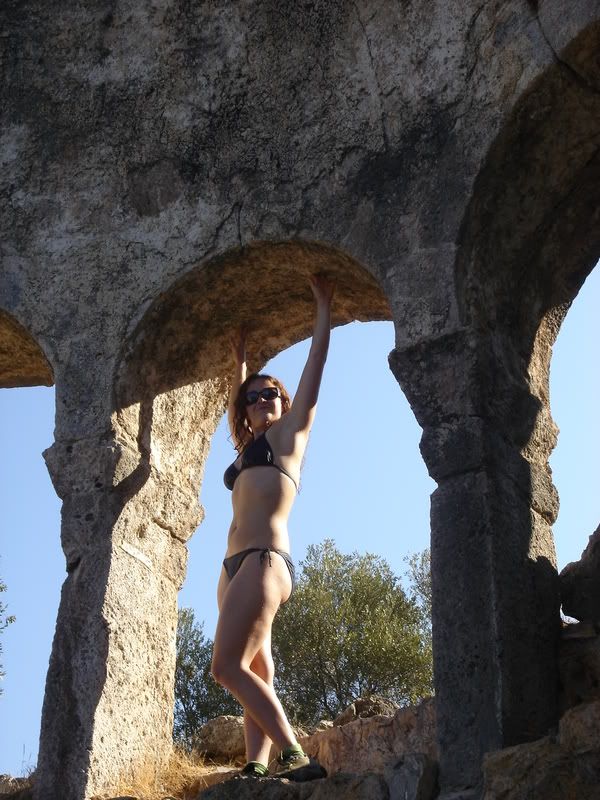
Sarah in the ruins
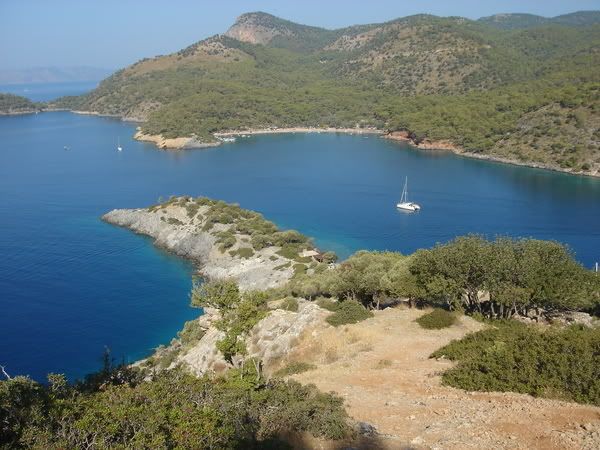
The view from the top
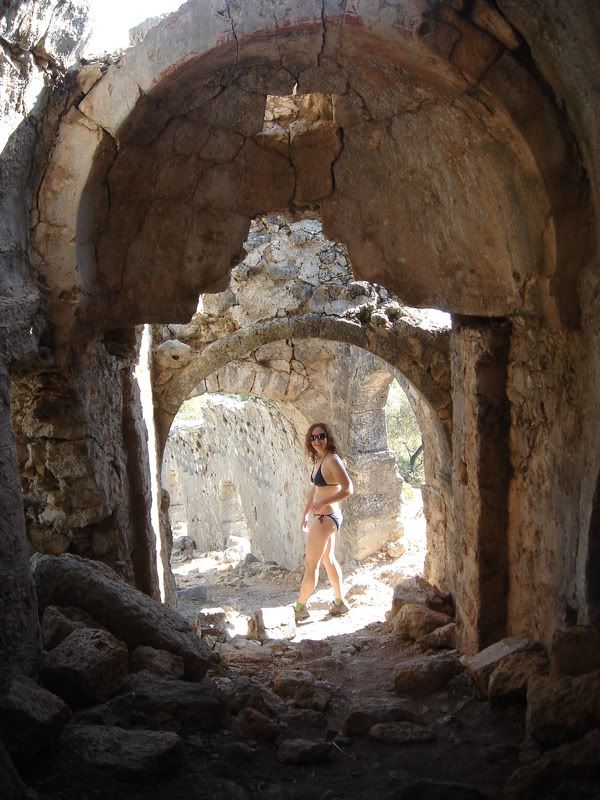
Sarah
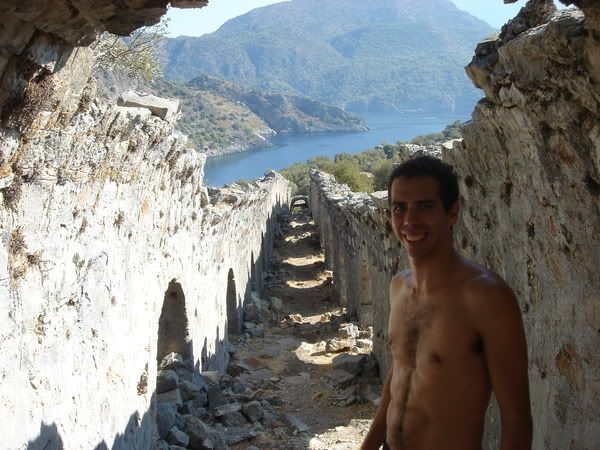
Me, at a long corridor that once connected two churches, its roof now collapsed
We made our way down through the rubble, picking our way past thorny bushes that scrapped at our copious amounts of exposed skin, exploring nooks and crannies, rambling past hundreds of buildings that represented thousands of years before we finally found our way back to the shore. We put our shoes up over our heads and swam back to the ship to eat breakfast.
***
I got to drive the boat through an inlet between the shore and an island. Yes, the captain and the crew entrusted their lives to me, though I've never driven a yacht before, allowed me to steer the ship even though this was dangerous, technically exact stuff.
Okay, so the inlet was like a mile wide and the captain was always two feet away, but I still got to drive the damn boat…
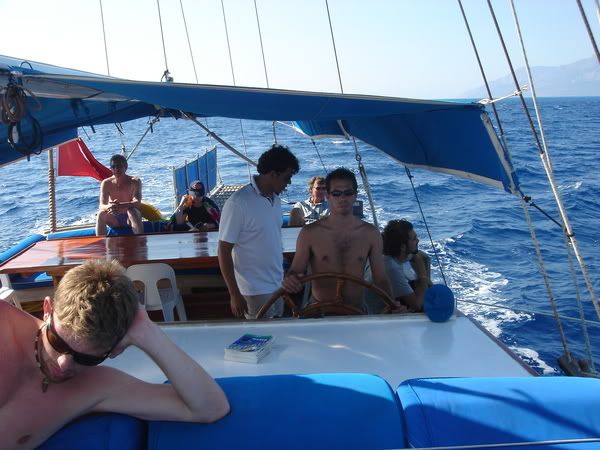
Me, with everyone's lives in my hands...
***
If you come at the right time, apparently Butterfly Valley is home to millions of butterflies who come their to mate. We missed the right time by about a month. We also had no time in general because due to an anchor issue and some other scheduling problems, the captain had been trying to pack two days of itinerary into one. Rather than cut some things out, he simply shortened everything, often drastically. When the yacht anchored, 200 yards from shore, we were told we had 30 minutes.
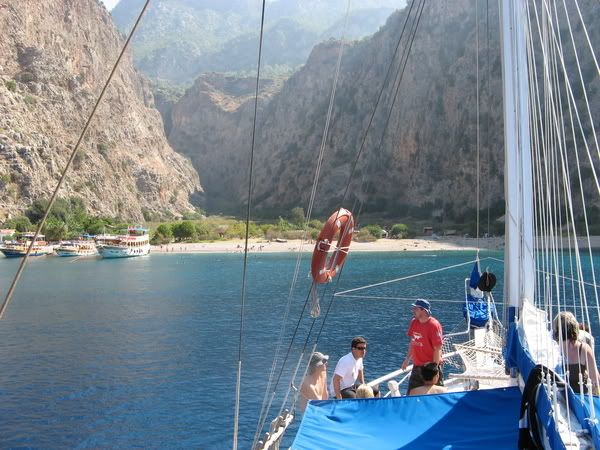
Butterfly Valley
Most of the other passangers choose to just swim around the boat, but our motley tribe decided to swim to shore. There we found many people on tours, basking on the beach, sitting in a wooden bar listening reggae music, paying to go parasailing. We wanted to see the valley.
They guy at the gate in front of the path into the valley wanted 4 lira each. This was like $2.50, but, as we tried to explain, we had swam to the shore and had not thought to bring money. No matter, said the guy. No lira, no valley.
This thwarted all but Brenna and I. Possibly not to either’s benefit, we found that our personalities formed a closed loop of headstrongness that soon had us pushing through a worker’s access gate about 100 yards from the pay gate that had a nice big “No Entrance!” sign on it in English and Turkish. Everyone else refused to follow, so Brenna and I Navy SEALed the fucker, communicating by hand signals as we snuck along an irrigation ditch past the guy at the pay gate and finally crossed some fields, flanking the guy and finding our way to the path into the valley.
Brenna was keeping an eye on time and we had none. By the time we got to the valley, we had only five minutes to get back to the boat. Satisfied that we’d at least got there, we turned and sprinted.
We were a good mile from the gate at that point, and running in wet bathing suits and sneakers is never comfortable, but we had a boat to catch (not that they’d leave without us, but pretending otherwise did make it exciting). We stopped as we reach the fields and once again silently snuck along the irrigation ditch and back through the worker’s gate, running for the beach, kicking off our shoes and swimming like mad for the boat.
I saw exactly one butterfly.
***
I met Yahya outside his carpet shop in Kash, overlooking a harbor packed with yachts, one of which was ours, anchored for the night. Although it was evening and the streets were mostly empty, his store was still open and would be until midnight, a managerial decision I never had explained to me.
Sitting outside in the warm late summer air, lit by the open doors and unshuttered windows behind him, he was finishing his day’s work: repairing a long tear in a large kilim that was someone’s family heirloom. Walking up, I would have told you he was fixing a carpet, but the the difference between a carpet and a kilim, as well as a dozen other carpet-related things, would be my educational experience for the night.
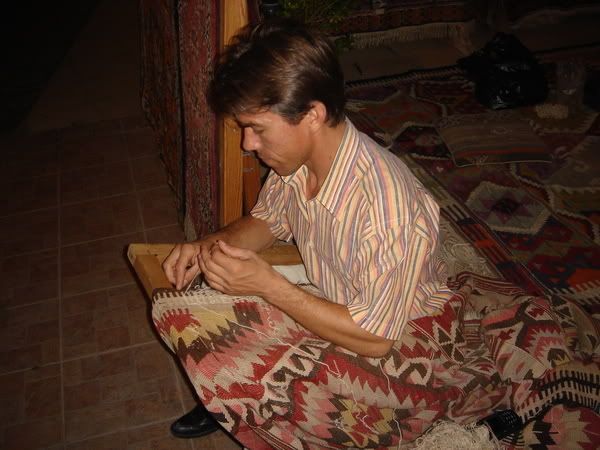
Yahya repairing the kilim
I asked to take his picture and he consented, then invited me to sit with him, pulling a pillow at me . I did, watching his hands quickly work a crochet hook over and under the weave, pulling through a piece of yarn that then bound the tear together, perfectly matching and making the rent disappear.
Yahya spoke fairly decent English and immediately corrected me when I asked him how long it took to repair the carpet. “Kilim,” he said. “No carpet. Kilim flat weave.” He demonstrated what he meant, showing me that that horizontal wool was woven over and under vertical wool, creating a flat piece of material. In carpets, he later showed me, thousands and thousands of strands of wool was individually tied onto vertical pieces of wool, causing them to stick up and creating a plush softness.
He asked where I was from, pleasantly surprised, as I have found many Turks to be, that I am American. Yahya later explained why this was. “Many Americans came to Turkey, but after 9/11, none of them come.” His opinion was reinforced by some other Turks a day later. The Turks we met seemed happily seemed to think Sarah and I represented the beginning of a resurgence in American tourism. We were baffled, because neither of us had ever regarded Turkey as unsafe. It is predominantly Muslim, yes, but is also a liberal, secular state with a fully-functioning democracy that is only a few hurdles away from EU membership. I regard Greece and Italy, with their rampant corruption and criminality, not to mention a strengthening mafia, to be far more dangerous. I was surprised to hear that Americans had stayed away.
As if to disprove the Americans comment, Brenna, Sarah and Ryan came up from their shopping to find me sitting with Yahya and reminded me that it was time for dinner before walking off to the boat. Sarah stayed behind and Yahya invited us inside. “I know you will no buy carpets,” he said. That was obvious, from Sarah’s $2 sunglasses to the duct tape holding one of my sandals together. “Come, I give you little gift.”
We went inside, to a store with its walls and floor covered in carpets, and hundreds stacked around the perimeter of the room. Yahya pointed out the four different types of carpets: wool, silk, cotton, and carpets that are amalgams of these materials. After explaining, carpets obviously being the obsession of his life, he pulled out a stack of woven pillow covers and told Sarah and I to each choose one as a gift. They were old and obviously had been used, not to be resold, but that he was giving us such a unique gift was still awesome. I chose one with two red squares, two blue ones and bordered in green. Now covering a pillow and sitting in a chair in my apartment, it clashes with absolutely everything, which is just the way it should be.
Yahya invited us back for tea after dinner.
***
While the rest of the boat went out in search of a bar, Brenna joined Sarah and I back at Yahya’s shop. Yahya, sitting on the floor with a glass of apple tea beside him, came under a barrage of questions.
Yahya was originally from Capodocia, a poorer region in the center of the country with a landscape better suited for the moon. He learned carpet weaving at his mother’s knee and was so good at it by the age of 13 that a carpet seller, making his rounds of the villages to buy carpets for resale in Istanbul, invited Yahya along. Only just a teenager, he left his family and everyone he knew to go weave carpets in Turkey’s largest city.
“I had to cook for myself, clean my dishes,” he said. “It was very hard.” I had to smile. I was thinking of this huge, bustling city, adults who may or may not take advantage of him and his skills, loneliness, exposure to bars, clubs, brothels, and yet Yahya’s memories were of a boy whose mother was no longer doing the domestic duties. After a few years, Yahya moved down to Kash, on the southern coast, where tourists came in on their yachts looking to spend their foreign currency on woven wool. He know owned half the shop, manning it until the wee hours of the night.
“Demi Moore, she come here,” he said. “And Madonna,” listing the famous people who had passed his carpet store. “She have two boats.”
When I told him I lived in Ukraine, he smiled knowingly. “You should visit,” I said at his smile. “Why?” he asked, the thought disdainful to him. “Beautiful things in Ukraine,” I said. He winked. “I know. They have come here.” His tongue darted up and touched the gap in his two front teeth, something he did whenever he made a joke.
“You like Ukrainian women?” I asked.
He shook his head. “I don’t want to die!” he said. “And I don’t spend money.” It took a few minutes to get clarification on this, but Yahya was of the opinion that Ukrainian women, all Ukrainian women were prostitutes and he neither wanted to A) pay for their services or B) get any lethal diseases. It was easy to see how he arrived at this generalization: most Ukrainian women who lived in Turkey were prostitutes. I wanted to point out that many were victims of human trafficking, lured to Turkey (and Germany, and Britain, and…) by promises of jobs as waitresses and hotel staff but then put to work as prostitutes, their passports taken from them and objections met with beatings, but Yahya was so adamant that Ukrainians the world over sold their bodies for money that it didn’t seem worth the effort and I didn’t want to upset him with an argument.
He put in the last word on it any way: “And they no buy carpets.”
***
“Flying carpet!” said Yahya, and one spun through the air towards me. He stuck his tongue to his teeth again, proud at his pun. I looked at the carpet now lying on the floor in front of me. It was beautiful, and this from a guy who didn’t get why people think carpets are beautiful. On a white background, a tree emerged from the bottom, multicolored birds on its branches. It wasn’t large, perhaps the size of a poster, but it was made of silk, said Yahya, then he flipped it over to show me how tightly packed all the knots were. It had come out of a wooden dowry chest that he stored his most valuable carpets in. He would sell it for around $3,000. In American it might fetch $15,000.
He went into the back room to make more tea and I overcame the urge to roll it up and run. $15,000 could be mine if I could just get out of the country. Instead it was right where Yahya had left it when he came back with more tea.
Yahya said that in a year he would probably sell about 600 carpets. Although of different values, he was still pulling down probably half a million dollars, much of which went back into inventory. Still, he wasn’t hurting: during the course of the evening he pulled out both a very expensive digital camera and an even more expensive mobile phone.
The carpet business was apparently a good one.
After our second glass of apple tea, Brenna asked about the differences in carpet quality. Yahya didn’t quite have the English for it, but he took us to a loom in the corner. He showed us the knot used in most carpets, especially those done by machines. It looped under itself only once. Giving a hard tug on the yarn, it came out of the vertical lines of wool. He then showed us the knot used in Turkey, which doubled back on itself twice, something only dexterous human fingers, not machines, could do (well, not cheaply anyway). No mater how you tugged on it, the yarn wouldn’t come out. Pulling a book off a shelf, Yahya showed us a picture of a 1,200 year old Turkish carpet currently in a museum in St. Petersburg. It looked dull and worn, but was completely intact.
Now that’s quality.
I had Yahya show me the knot again and sat down to do it while he pulled out a carpet he had woven himself to show Brenna and Sarah. The knot was hard to do, my fingers fumbling, but I slowly got it down while Yahya explained the symbolism woven into the carpet, and how each shape demonstrated what was on his mind when he made it: the yearning for love. Eventually I had knotted ten or so pieces of yarn, finishing another line over the one Yahya had done. After cutting them to length with a pair of special scissors that must have been 50 years old, my line perfectly matched. I had just helped make a Turkish carpet! Make that a Cuban-American-Turkish carpet!
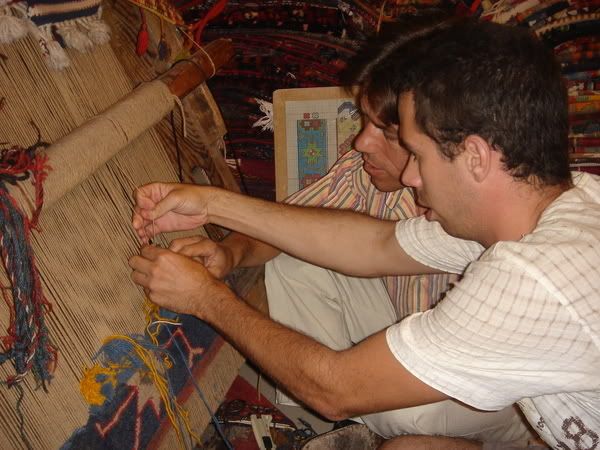
Yahya showing me the Turkish double knot
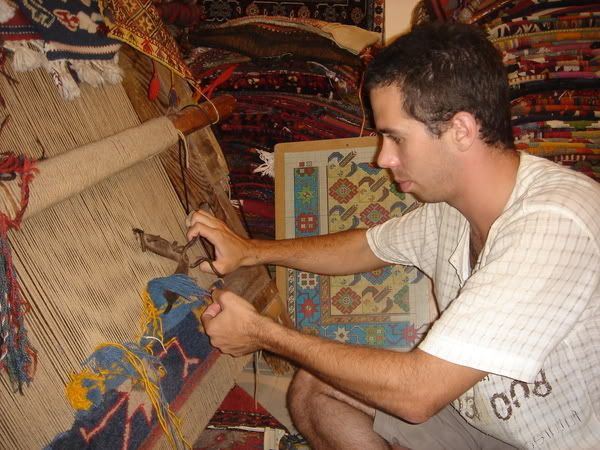
Trimming the yarn down after knotting a line
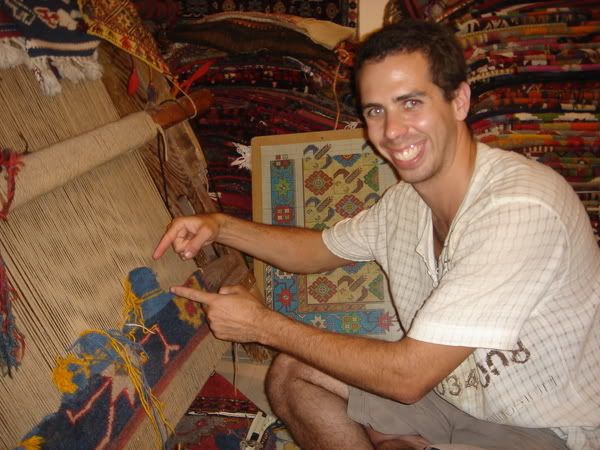
My one line of carpet
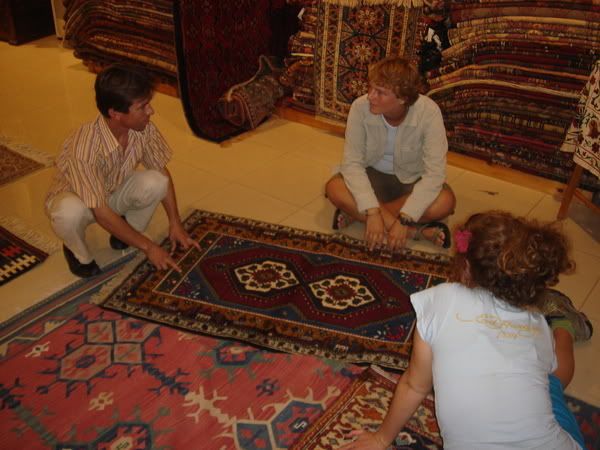
Yahya explaining the symbolism in a carpet he had made
The tea had forced me to leave and go to the bathroom shortly thereafter, and when I got back, Brenna had pulled me aside. Apparently, while Sarah had been looking at carpets on a wall, she and Yahya had a conversation that had gone like this:
“You like girls? You lesbian?”
“Yes,” Brenna had said.
“You dated guy before?”
“Yes.”
“Maybe you date one again?” he had asked hopefully.
Later, he convinced her, to mild protestations, to give him a back massage. Since he had been kind and had given her a pillow cover as well, she obliged while Sarah flipped threw a carpet book, and I laid down on a stack of carpets, realizing how tired I was.
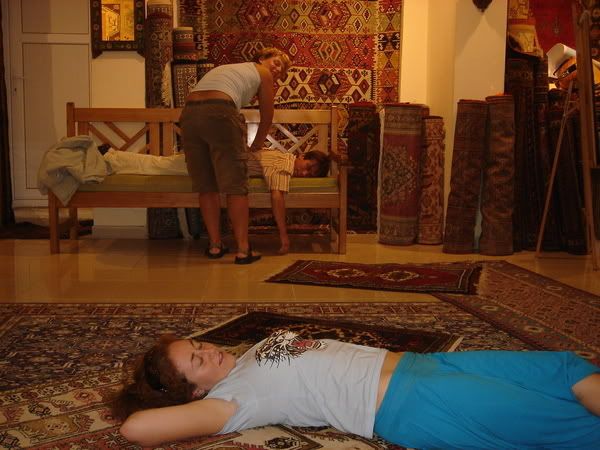
Everyone relaxing in the carpet shop
The carpet on top was old, almost a hundred years old, and huge, about fifteen feet by six feet. Expressing my happiness at its softness, Yahya offered it to me for $600. Everyone’s mouths dropped open.
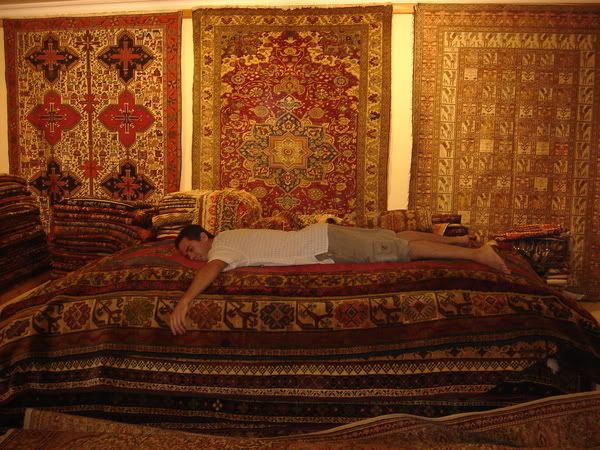
Yahya offered me the top carpet for $600
“Take it,” said Brenna. It would easily fetch $3000 in America.
Of course I didn’t have that much money. Nor that much room in my backpack.
***
The end of the evening, after Yahya closed shop, found us in “The Secret Garden”, a bar with a hookah (“Nargehleh” in Turkish). Brenna had made sure she was sandwiched between Sarah and myself and I felt almost bad for Yahya has the conversation, aided by much apple flavored tobacco (which, since we don’t smoke, definitely gave Brenna and I a buzz), sped out of control and mostly centered on male and female roles.
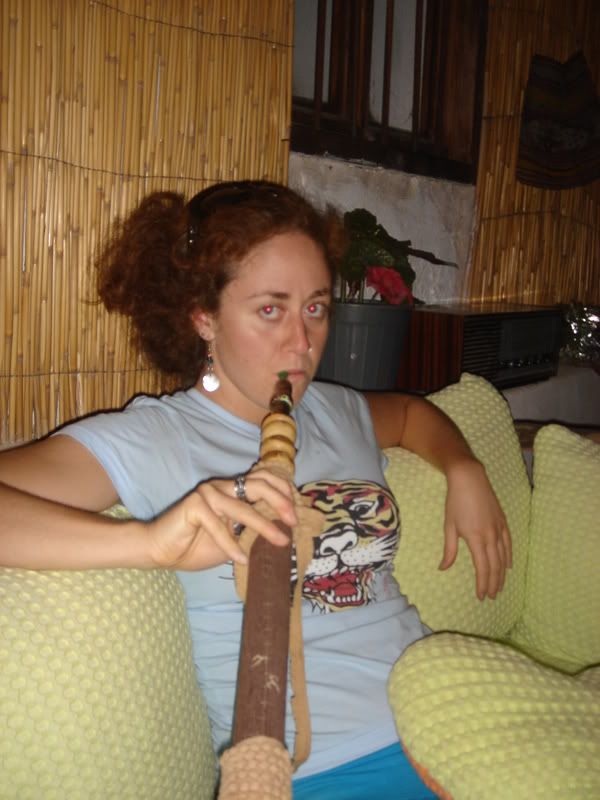
Sarah on the hookah
The rest of the boat crew inadvertently found us when they independently came into the bar. “Bar” tends to connote a smoky interior, but we were outside, sitting on cushions, smoking out of a pipe so long it looked like a musical instrument, hooked up to a four foot tall hookah with a metal horse impaled on the pipe leading up to the coals. I will say one thing: Turks have relaxation down to an art form. Although the rest of the party took over another table, Stella came over to ours and nestled in beside me. The ambiguity of whether her wrist, hand hanging limp, was on my knee out of necessity or flirtation was pleasantly distracting, and as smoke curled out of my mouth I reflected on waking up on the deck of a boat, swimming to an island covered in ruins, steering a yacht for the first time, sneaking into a valley, weaving a carpet and ending the evening smoking flavored tobacco on a warm, moonlit summer night with the warmth of a beautiful Greek girl beside me.
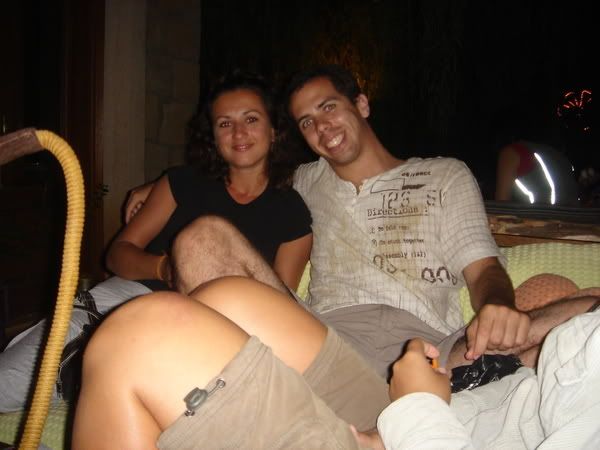
Stella and I
And Americans were afraid to come here?
Good. More for me.